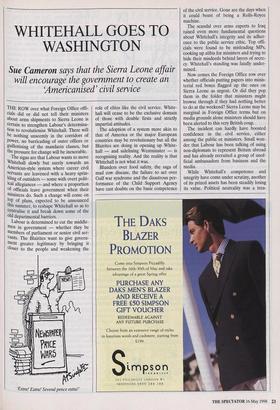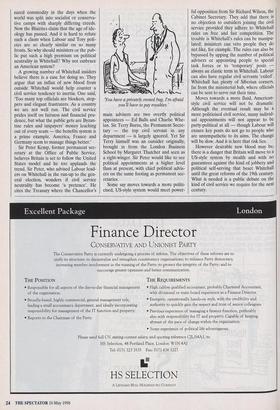WHITEHALL GOES TO WASHINGTON
Sue Cameron says that the Sierra Leone affair
will encourage the government to create an Americanised' civil service
THE ROW over what Foreign Office offi- cials did or did not tell their ministers about arms shipments to Sierra Leone is certain to strengthen Labour's determina- tion to revolutionise Whitehall. There will be nothing unseemly in the corridors of Power, no barricading of outer offices or guillotining of the mandarin classes, but the pressure for change will be inexorable. The signs are that Labour wants to move Whitehall slowly but surely towards an American-style system where career civil servants are leavened with a heavy sprin- kling of outsiders — some with overt polit- ical allegiances — and where a proportion of officials leave government when their ministers do. Such a change will come on top of plans, expected to be announced this summer, to reshape Whitehall so as to centralise it and break down some of the old departmental barriers. Labour is determined to cut the middle- men in government — whether they be members of parliament or senior civil ser- vants. The Blairites want to give govern- ment greater legitimacy by bringing it closer to the people and weakening the Extra! Extra! Several pence extra!' role of elites like the civil service. White- hall will cease to be the exclusive domain of those with double firsts and strictly impartial attitudes.
The adoption of a system more akin to that of America or the major European countries may be revolutionary but all the Blairites are doing in opening up White- hall — and sidelining Westminster — is recognising reality. And the reality is that Whitehall is not what it was.
Blunders over food safety, the saga of mad cow disease, the failure to act over Gulf war syndrome and the disastrous per- formance of the Child Support Agency have cast doubts on the basic competence of the civil service. Gone are the days when it could boast of being a Rolls-Royce machine.
The scandal over arms exports to Iraq raised even more fundamental questions about Whitehall's integrity and its adher- ence to the public service ethic. Top offi- cials were found to be misleading MPs, cooking up alibis for ministers and trying to hide their misdeeds behind layers of secre- cy. Whitehall's standing was fatally under- mined.
Now comes the Foreign Office row over whether officials putting papers into minis- terial red boxes flagged up the ones on Sierra Leone as urgent. Or did they pop them in the folder that ministers might browse through if they had nothing better to do at the weekend? Sierra Leone may be marginal in Foreign Office terms but on media grounds alone ministers should have been alerted to this very British coup.
The incident can hardly have boosted confidence in the civil service, either among the public or ministers. Small won- der that Labour has been talking of using non-diplomats to represent Britain abroad and has already recruited a group of unof- ficial ambassadors from business and the media.
While Whitehall's competence and integrity have come under scrutiny, another of its prized assets has been steadily losing its value. Political neutrality was a trea- sured commodity in the days when the world was split into socialist or conserva- tive camps with sharply differing creeds. Now the Blairites claim that the age of ide- ology has passed. And it is hard to refute such a claim when Labour and Tory poli- cies are so clearly similar on so many fronts. So why should ministers or the pub- lic put such a high premium on political neutrality in Whitehall? Why not embrace an American system?
A growing number of Whitehall insiders believe there is a case for doing so. They argue that an influx of new blood from outside Whitehall would help counter a civil service tendency to inertia. One said, `Too many top officials are blockers, stop- pers and elegant frustraters. As a country we are not well run. The civil service prides itself on fairness and financial pru- dence, but what the public gets are Byzan- tine rules and taxpayers' money leaching out of every seam — the benefits system is a prime example. America, France and Germany seem to manage things better.'
Sir Peter Kemp, former permanent sec- retary at the Office of Public Service, believes Britain is set to follow the United States model and he too applauds the trend. Sir Peter, who advised Labour lead- ers on Whitehall in the run-up to the gen- eral election, wonders if civil service neutrality has become 'a pretence'. He cites the Treasury where the Chancellor's `You have a privately owned bug. I'm afraid you'll have to pay royalties.'
main advisers are two overtly political appointees — Ed Balls and Charlie Whe- lan. Sir Terry Burns, the Permanent Secre- tary — the top civil servant in any department — is largely ignored. Yet Sir Terry himself was an outsider originally, brought in from the London Business School by Margaret Thatcher and seen as a right-winger. Sir Peter would like to see political appointments at a higher level than at present, with chief political advis- ers on the same footing as permanent sec- retaries.
Some say moves towards a more politi- cised, US-style system would meet power- ful opposition from Sir Richard Wilson, the Cabinet Secretary. They add that there is no objection to outsiders joining the civil service provided they adhere to Whitehall rules on free and fair competition. The trouble is Whitehall's rules can be manipu- lated; ministers can veto people they do not like, for example. The rules can also be bypassed by upping the number of political advisers or appointing people to special task forces or to 'temporary' posts always an elastic term in Whitehall. Labour can also have regular civil servants 'exiled'. Whitehall has plenty of Siberian corners, far from the ministerial hub, where officials can be sent to serve out their time.
Moves towards a more fluid, American- style civil service will not be dramatic. Although the eventual result may be a more politicised civil service, many individ- ual appointments will not appear to be party-political at all — though Labour will ensure key posts do not go to people who are unsympathetic to its aims. The change will be slow. And it is here that risk lies.
However desirable new blood may be, there is a danger that Britain will move to a US-style system by stealth and with no guarantees against the kind of jobbery and political self-serving that beset Whitehall until the great reforms of the 19th century. What is needed is a public debate on the kind of civil service we require for the next century.



























































 Previous page
Previous page